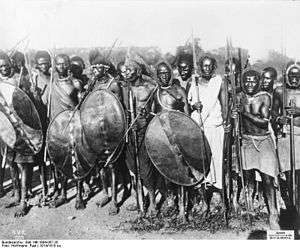Ruga-Ruga

Ruga-Ruga (sometimes called Rugaruga) were irregular troops in Eastern Africa, often deployed by western colonial forces.[1] They often served as mercenaries or local auxiliaries alongside the regular Askari, professional soldiers who were often hired in other regions of Africa.[2] While the latter were trained by officers of the European colonial powers in Africa, the Ruga-Ruga were mostly hired from tribal warriors during times of conflict.[3]
History
The term Ruga-Ruga for armed guards in caravans and mercenary troops of Nyamwezi-chieftains dates back to at least 1820, according to Pesek.[4]
Later, the word Ruga-Ruga was used to denote any unit of auxiliary troops in Eastern Africa.[1] Ruga-Ruga came into knowledge first as an auxiliary force of Nyamwezi-chieftain Mirambo, dubbed the Napoleon of Africa by Henry Morton Stanley. Mirambo, a trader of ivory and slaves, gathered a militia of young men without social ties to defend his interests against the Arabs of the Swahili coast. This unit consisted mostly of former slaves or porters.
During World War I ruga-ruga fought alongside the British as well as the German side in the East African Campaign. The Askari-troops of the German Schutztruppe, the armed forces of German East Africa under the command of Paul von Lettow-Vorbeck, were often supported by ruga-ruga units of approximately the same size. The ruga-ruga thus effectivley doubled the manpower of the German colonial forces after the outbreak of war.
When Lettow-Vorbeck accepted the armistice on 23 November 1918 after four years of guerilla warfare and severe casualties on both sides and among civilians, the mixed force of ruga-ruga, some askaris and a few German survivors was the last unit to surrender in World War I.[5]
Cultural heritage
Iron breaks the head, a war song of the ruga-ruga, is still sung in today Tanzania and can be sometimes heard at political gatherings.
References
- 1 2 Karl Weule: Rugaruga, in: Heinrich Schnee (Hrsg.); Deutsches Koloniallexikon. Band III, Berlin: Quelle & Meyer, 1920, S. 192. German
- ↑ Heiko Möhle: Kolonialismus und Erinnerungspolitik. Die Debatte um die Hamburger „Askari-Reliefs“ In: Umbrüche in afrikanischen Gesellschaften und ihre Bewältigung. herausgegeben von Ludwig Gerhardt; Heiko Möhle; Jürgen Oßenbrügge; Wolfram Weisse, LIT, Afrikanische Studien, Universität Hamburg, 2006, ISBN 3-8258-7518-0, S. 277f. German
- ↑ Moyd, Michelle "Askari and Askari Myth" in Prem Poddar et al. Historical Companion to Postcolonial Literatures: Continental Europe and its Colonies, Edinburgh University Press, 2008.
- ↑ Pesek, Michael: The history of an East African profession, 1820-1919 Berlin
- ↑ Moyd, Michelle Violent Intermediaries: African Soldiers, Conquest, and Everyday Colonialism